Types of boilers for heating a private house. What are universal heating boilers, their advantages and types of fuel?
The most effective and economical are considered gas boilers heating. But gas pipelines are not laid everywhere now, especially for holiday villages and places where the main fuel is coal or other types of fuel. Manufacturers offer universal heating boilers, which solve the problem of what kind of fuel is in this moment it is better to use and what can be replaced in an unforeseen situation.
What are the advantages of combi boilers
Any of the boilers is the main part of the heating system of a private house, not to mention more complex structures district or city thermal power plants. In houses with centralized heating few people think about the possibilities and problems with the supply of heating and hot water, but for homeowners this issue remains pressing and very important.The heating system should provide convenience and coziness, regardless of what communications are nearby. Low-rise construction is currently gaining enormous scale, and the process of providing houses with fuel resources is still difficult to solve in some regions of the country.
A way out of the situation can be a universal heating boiler for a private home, operating on two or more types of fuel. The limitation, in this case, can be from two to four types of fuel:
- coal, pellets, firewood, biofuels, etc.
- electricity;
- diesel fuel, fuel oil.

Externally universal boilers not much different from other models heating devices. But their internal design allows you to switch from one type of fuel to another. As a rule, such equipment has a heating element, one or two combustion chambers, a combined burner capable of operating at different types energy resources.
Universal boilers are also called multi-fuel or combined boilers. Depending on the model, they can switch from coal or gas to solid or solid fuel without much difficulty or reduction in efficiency indicators. diesel fuel. This occurs due to the equipment being equipped with combined or replaceable burners.
- economical - there is always the opportunity to switch to a more profitable fuel option;
- safe - they can be installed in residential buildings;
- unpretentious - by simple changes in the settings, a reorientation to another type of fuel is made;
- varied in size and design - you can choose compact or large, single or double-circuit equipment, wall-mounted or floor-standing models;
- have a sufficiently high efficiency, ensuring effective work heating systems.
A distinctive feature of a universal boiler is the presence in its design of separate combustion chambers, separately for solid fuel materials, separately for gas or diesel fuel. If the package also includes a heating element, then such a heater provides high reliability in conditions of possible interruptions in the power supply or untimely delivery of the main type of fuel.
Universal heating boilerindispensable for autonomous heating systems of buildings located far from the city and centralized gas mains. His choice in this situation is useful, appropriate and justified.
But it doesn’t make sense to purchase a combination boiler “just in case,” since its efficiency is lower than that of single-fuel equipment.

What are universal boilers?
The main division of heating boilers occurs according to the type of fuel that is intended for their operation. The combination may vary. Equipment is marked according to the first letters of the names of the combustible materials used. For example, the abbreviation “TG” means that the boiler can easily operate on both solid fuel (coal, wood, pellets) and gas. And the mark “TGE” indicates that the coolant can be heated using solid fuel, main or liquefied gas, as well as electricity.
Universal boilers for heating a private home have different power and performance. These indicators play a significant role when choosing equipment. When purchasing a boiler, pay attention to the availability of a particular type of fuel.
Why is fuel choice so important for consumers?
Each type of energy resource has its own characteristics.
- Main gas.
The most profitable option, but not always possible due to the lack of 100% gasification in some regions of the country. Another obstacle is the need to obtain permits, although this issue can be resolved.
- Liquefied gas.
Alternative natural gas, coming through the pipeline. The cost of liquefied fuel is relatively low, but the cylinders need to be refilled from time to time, so it is worth planning for their transportation in advance.

- Electricity.
Here you will have to prepare for certain material costs. Firstly, you will have to run a separate cable from the electrical panel. Secondly, it will be necessary to obtain documents from Energonadzor when connecting to a 380V network. Third, the cost of electricity is high, so heating the house large area it will be too expensive.
The best option is to use electricity as an additional source of heating, used in rare cases.
- Firewood, coal, pellets.
They require constant monitoring, since their unpredictable combustion can lead to overheating of the system or to its cooling. Solid fuel will be beneficial to consumers living in regions where the cost of coal and firewood is quite affordable. If the owner is absent from the house for a long time, the boiler, depending on the model, can be switched to gas or electricity.
- Diesel fuel.
It has bad smell, therefore it should be stored in an insulated room, preferably separate. Diesel fuel is considered an expensive fuel, but sometimes it is irreplaceable. If you are waiting for gasification of the area, for example, a gas-diesel boiler will work perfectly for the required period using liquid fuel. Such a boiler is interesting because its design has only one combustion chamber. When switching to another fuel, the burner is replaced and minor adjustments are made.
Having a universal boiler in the house, the consumer has the opportunity to choose the most profitable type of fuel for each specific situation. This is the benefit of multi-fuel equipment.
If a gas pipeline is connected to a cottage or dacha, the question of “how to warm up” usually does not arise. There are many options among gas boilers for heating a private home. Knowing the features of each of them will help you decide on the model you need.
What types of gas heating boilers are there?
Gas is considered one of the cheapest types of fuel, so devices running on it are very popular. The efficiency and economy of future heating depends on how correctly you choose the boiler. There is practically no difference in the operation of devices using natural or liquefied “blue fuel”. When purchasing, pay attention not only to the price or brand of the unit, but also to its technical parameters.
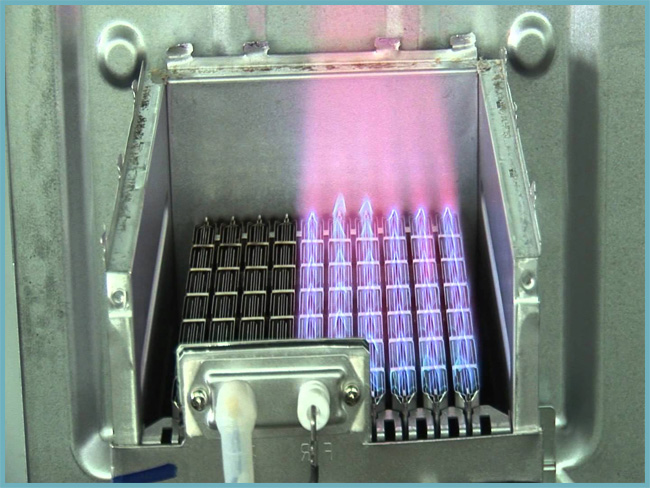
Burner gas boiler
Gas boilers for heating a private house have the following characteristics:
Number of circuits:
- one;
The combustion chamber:
- open;
- closed.
Traction:
- natural;
- forced.
Power level:
- single stage;
- two-stage.
Burner option:
- atmospheric;
- ventilator
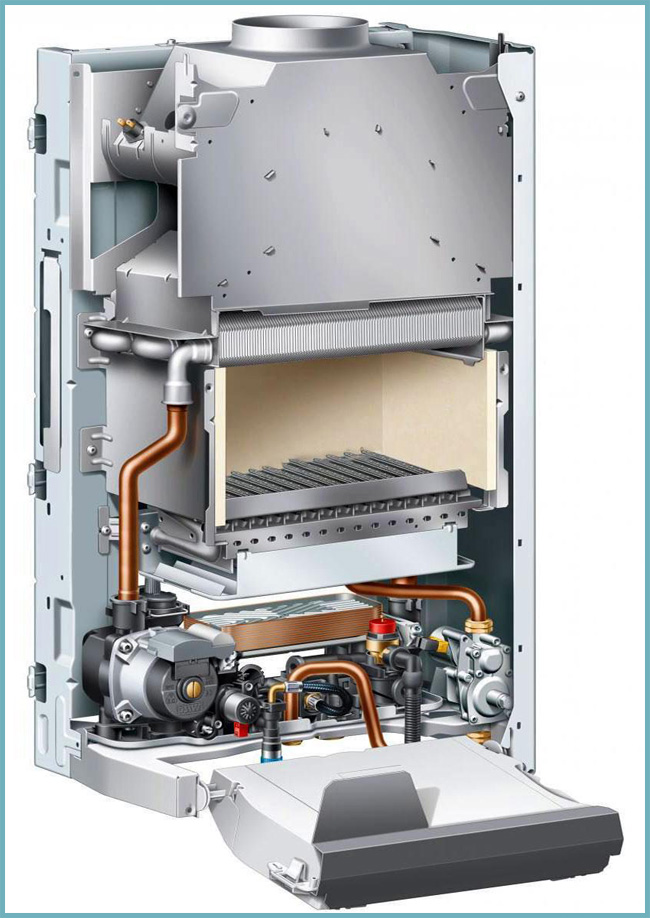
Gas boiler device
Ignition:
- electric;
- using a piezoelectric element;
- manual (with matches or a lighter).
Location:
- floor;
- wall;
- parapet.
Heat exchanger metal:
- steel;
- cast iron;
- copper.
Single-circuit gas boilers
Such units are used for only one purpose: to heat the room. More often single-circuit boilers They are installed in houses with an area of up to 300-350 sq. m. These devices are cheaper than double-circuit ones and are easier to install and service. At the same time, they take up quite a lot of space due to the fuse, pump, etc. (in models with two circuits, a lot is built inside). Because of this, you should not place it in a visible place; it is better to equip a separate room.
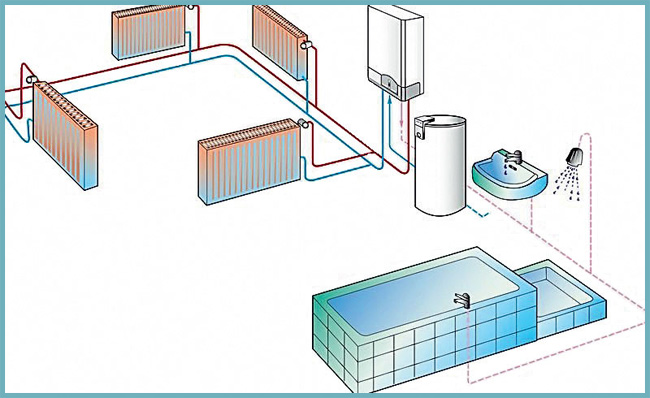
Diagram: connecting a gas single-circuit boiler
In addition, if over time you need hot water supply, you will need extra bed for boiler with indirect heating. It is connected to a heating device. It is also worth considering that a single-circuit boiler is less economical. It constantly warms up the water when it starts to cool, even when you're not using it.
Attention! If a single-circuit unit is equipped with automation, it can provide warm floors, ventilation, etc. in your home.
Double-circuit gas boilers
These devices perform a dual function: they heat the house and heat water for domestic needs. At the same time they occupy less space than their single-circuit counterparts. When choosing a double-circuit boiler, decide how much hot water you will need:
- For small volumes, a unit operating on running water.
- If you have a large family, give preference to a model with a built-in boiler. Its volume is about 150-200 liters.
![]()
Construction of a double-circuit gas boiler
The double-circuit boiler will become a good decision For small room, because it is more compact than a device with a single circuit. If you haven't used it for a while hot water, it's cooling down. Heating resumes when the tap is opened, so you have to wait until it drains cold water. Each time you will have to drain several liters.
Advice. Experts who install double-circuit boilers say: the distance between the device and the farthest tap (in the bathroom or kitchen) should be a maximum of 5-7 m. This way heating will occur in the shortest possible time.
Another feature of boilers with two circuits: they are designed for only one point (one tap or mixer). This leads to an uneven distribution of hot water. For example, if you wash dishes and simultaneously open the tap in the bathroom, the stream from the pipe in the kitchen will become cooler. You can solve the problem by choosing a boiler with a built-in boiler or installing an additional one with indirect heating.
Floor, wall and parapet devices: features
Traditional boilers, which are installed on the floor, have great power and are able to heat big houses. They are bulky, so they need a separate room to accommodate them. It should be equipped with ventilation and a chimney. The pipe must rise above the roof by at least 0.5 m to ensure good traction.
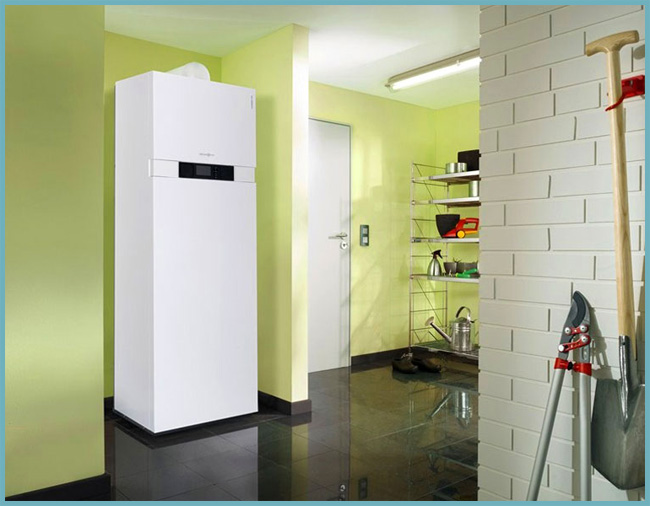
Floor standing gas boiler
If you do not need to heat a large room, opt for another boiler model, for example, a wall-mounted one. Such a device is compact, less powerful, but not inferior to floor-standing units in terms of functionality. These boilers are controlled automatically, which allows you to install different temperature regime for night and day. If for some reason the gas supply is stopped, the boiler will turn off on its own. In the same way, it will resume work when the “blue fuel” runs through the pipes again.
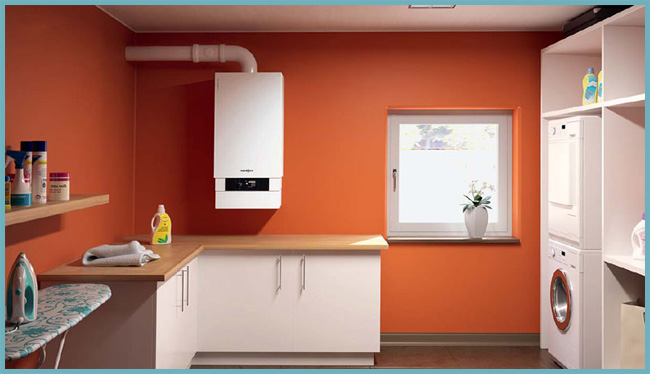
Wall-mounted gas boiler
The middle position between floor and wall-mounted devices is occupied by low-power parapet (smokeless) boilers. They can even be installed under a window; they are best suited for small houses. These units do not require a traditional chimney, because combustion products escape through a coaxial chimney. It is a “pipe in a pipe” and is mounted on external wall building. Unlike other types of boilers, parapet boilers do not use oxygen from the room in which they are located during combustion.
How does draft type affect boiler operation?
Devices operating on natural draft are called atmospheric. To burn the gas, they take oxygen from the room in which they are located. The release of waste substances occurs through the chimney; from the outside it looks like chimney. Boilers with natural traction have the following advantages:
- simplicity of design;
- quiet operation;
- relatively low price;
- autonomy - they do not depend on electricity.
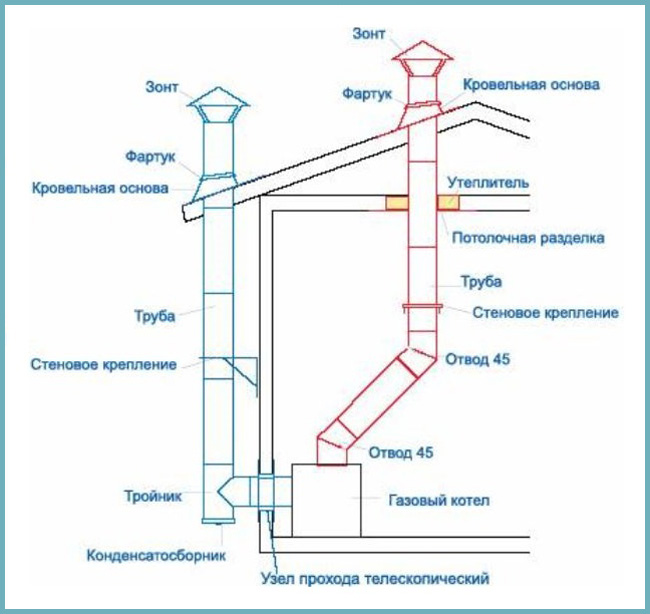
Chimney of a gas floor boiler
Among the disadvantages, one should keep in mind the unstable operation of the device when the pressure in the gas lines changes. If it decreases, the flame may go out. In such conditions, “blue fuel” is consumed very uneconomically. Those who install forced draft boilers do not face this problem. Other advantages of such units include the fact that they:
- do not burn oxygen in the room;
- do not require installation of a vertical chimney;
- can be placed in almost any home.
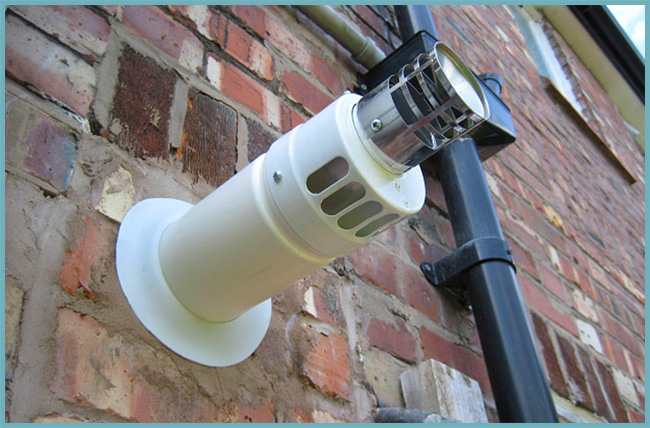
Boiler operation without a chimney
Devices that operate on forced draft are called fan or supercharged. They require installation to work. coaxial chimney. Oxygen is supplied through it for the combustion of “blue fuel”, and substances formed as a result of the operation of the boiler are removed. All this happens with the participation of fans. They perform their functions by making noise, which can cause inconvenience to residents. Other disadvantages of forced draft units are their high cost and dependence on electricity.
Advice. When buying a gas boiler that requires electricity, purchase a voltage stabilizer or an uninterruptible power supply.
Ignition methods and types of burners - how to decide when purchasing
In accordance with the type of draft, boilers use atmospheric or fan (pressurized) burners. The former are cheaper and operate almost silently. As a rule, they are included in the composition and cost heating device. Fans must be purchased separately, but they can be replaced. Supercharged models have high efficiency and are considered more powerful and expensive. However, they create additional noise and do not work in the absence of electricity.
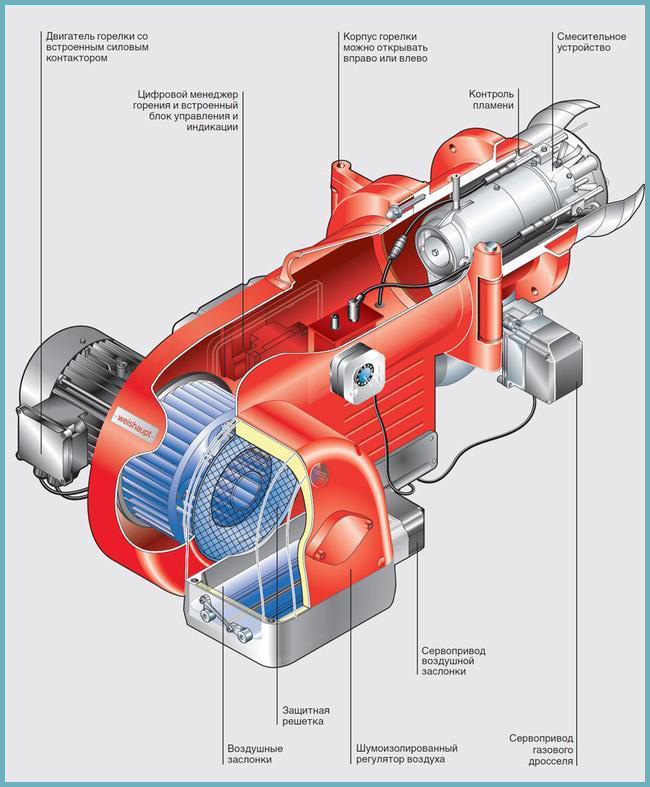
Scheme: forced gas burner
The easiest way to light the burner is with matches or a lighter. However, for the convenience of users, many models of modern boilers are equipped with electric ignition or a piezoelectric element. In the first case, the start is carried out automatically, thanks to an electric spark. This allows you to save gas, because such a device does not require a constantly burning wick. For a unit with piezo ignition, it is mandatory; the boiler with this element is turned on manually by pressing a button, but does not depend on electricity.
Additional characteristics of gas boilers: what to look for
Choosing a heating device country house, ask about its power. Assume that for effective heating 10 sq. m requires 1 kW - if the ceiling height does not exceed 3 m. In addition, the power level is also important. When choosing a single-stage boiler, keep in mind that it constantly works with the same force. At the same time, there is no way to control the flow of gas, as in two-stage units. Smooth switching of the “blue fuel” consumption mode (for example, depending on the climate or time of year) allows you to save.
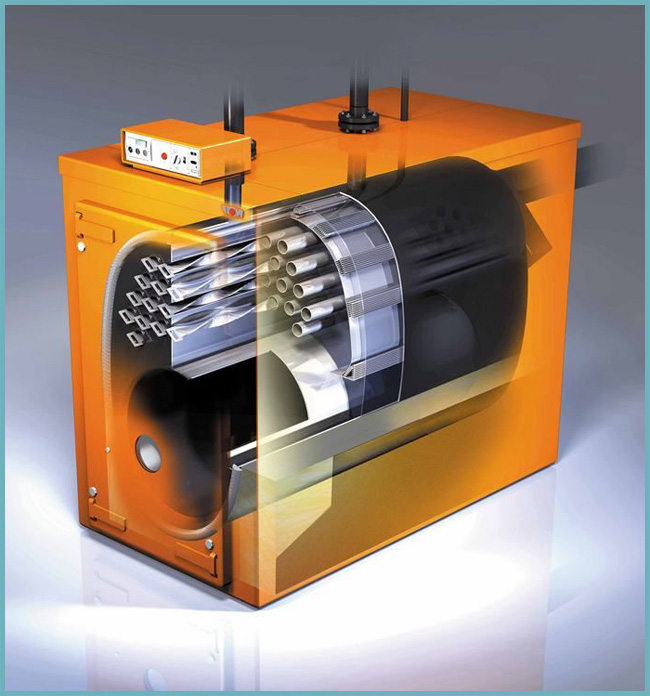
Steel gas boiler
Another parameter that you should pay attention to is the combustion chamber. Most often in devices with natural draft you can find open type, when oxygen for combustion is taken from the living space. If there is insufficient ventilation, this can be life-threatening, so it is better to provide a combustion chamber for such a unit. Closed chamber combustion, which is often installed in fan boilers, takes air from outside. It is safer to use, but more expensive to purchase.
Experts also advise paying attention to what the main element of a gas boiler is made of - the heat exchanger in which the water is heated.
- Cast iron is fragile and reacts to temperature changes. At the same time, it lasts longer (30-40 years), is resistant to corrosion and retains heat better.
- Steel is not afraid of temperature changes, fits well into the interior of the house, but is more often subject to corrosion. Its service life is 15-25 years.
- Copper is the most expensive material, which at the same time has the following advantages: resistance to rust, uniform heating, high efficiency.
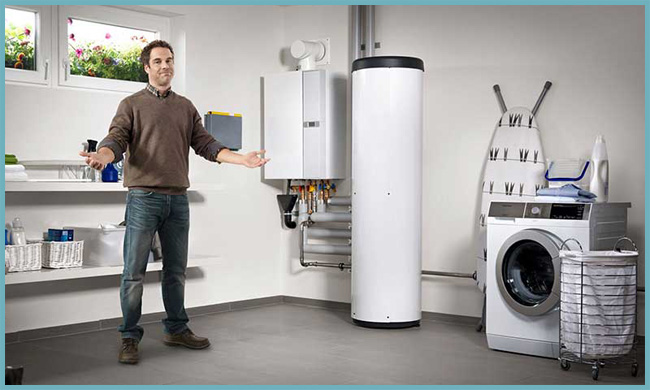
Be prepared for the fact that the floor-standing gas boiler is quite large.
In addition, more expensive models gas units usually equipped with automation, which:
- blocks the boiler when the gas is turned off;
- controls traction;
- turns off the gas if the flame goes out, etc.
When buying a boiler, remember that not only the warmth in your home, but also your safety depends on it. Therefore, first of all, compare devices not by price or brand recognition, but by technical parameters, choosing the best ones for yourself.
All boiler equipment is conventionally divided into two very large groups, differing in purpose - for boilers for domestic needs and for industrial boilers. Each of these groups has its own internal classification by species with certain common features. Without touching upon the topic of industrial boiler equipment today (this is more interesting to narrow-profile professionals), below we have prepared materials intended more for consumers who are faced with a choice - which boiler to choose for heating a house or apartment. Moreover, today this issue is relevant not only for owners individual houses, but also helps residents of apartments in apartment buildings save money.
Classification by functionality
Based on functionality, it is customary to distinguish between double-circuit and single-circuit boilers. The first type of equipment meets your heating and supply needs simultaneously household V hot water for household needs. Single-circuit ones are intended solely to provide heating systems and space heating.
When choosing which boiler to buy based on these characteristics, you should consider not only specifications, how much your needs. For example, if you already have other devices installed for heating domestic water, then it is enough to buy a single-circuit boiler.
Based on functionality, a distinction is also made between boilers with and without automatic safety systems. Almost everything modern models Domestic boiler equipment today is equipped with automation, which, along with safe operation, ensures easier ignition and switching on. The only exception is solid fuel boilers.
Pro Tip: If you want to save on installation space or liner, let's say gas pipes, double-circuit boilers seem more profitable.
Classification of types of domestic boilers by energy source
This classification method applies to all domestic boiler equipment. Choice specific type The boiler size here is determined by the presence of a centralized energy supply in your area - gas or electricity. When supplied with the most economical gas profitable solution There will be a gas boiler installed.
About gas boilers
Today, more than 50% of all premises are equipped with gas stakes. This type of boiler is represented on the heating equipment market in the same ratio to the total volume of supply.
Gas boilers are very convenient to use in systems autonomous heating. Almost all modern models are equipped automatic systems safety and control units for setting various operating parameters, such as manual or automatic adjustment temperature. Their capabilities allow you to economically consume blue fuel, turn on and off (reduce) gas consumption according to a time set by a timer (for devices with it or through additional equipment).
They are manufactured in both double-circuit and single-circuit versions. Depending on the installation method, there are floor and wall mounted ones. They differ in power and are selected according to this parameter in accordance with preliminary thermal calculations.
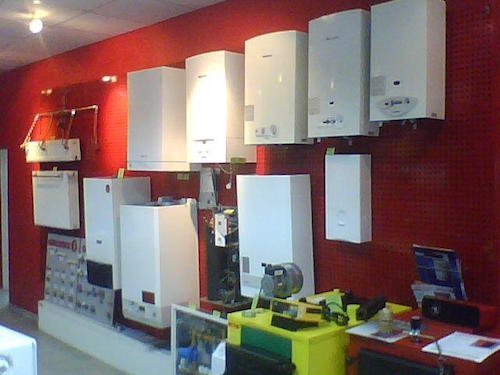
Advice from professionals: when choosing a gas boiler, pay attention to how combustion products are removed. Models with forced cleaning of the boiler from smoke are preferable. They do not require a chimney.
They are generally recognized as the most environmentally friendly type of boiler equipment. Heating of the coolant is carried out by special heating elements placed in the tank. They are equipped with automatic overheating protection and control systems. They are absolutely silent in operation and have minimal overall dimensions.
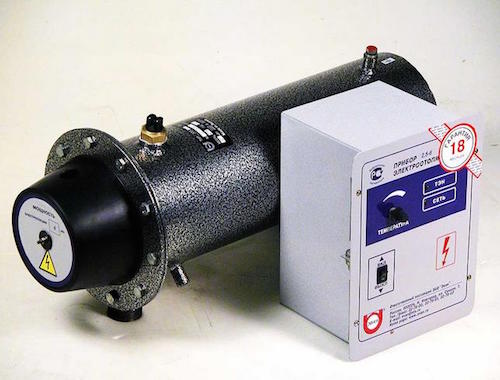
Just like gas ones, they are manufactured in floor and mounted versions executions, single-circuit and double-circuit. Among the clearly beneficial advantages is that they do not require devices for forced or natural (chimney) removal of combustion products due to the absence of the latter. Among the disadvantages, users note high costs for paying for electricity.
Solid fuel and liquid fuel boilers
These two independent species boiler equipment uses coal, firewood, fuel briquettes or liquid fuel - diesel fuel, rarely gasoline. Recommended (often the only possible variant) for installation where there is no gas supply or where there is no technical ability to connect electric boilers.
